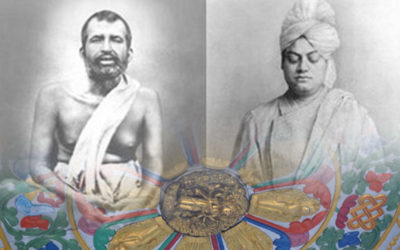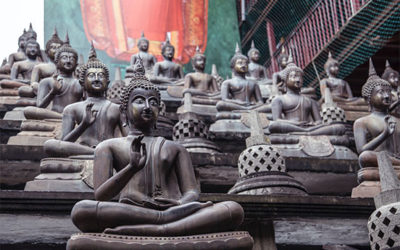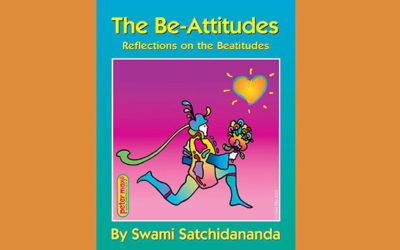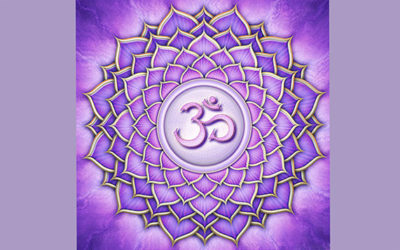I don’t know about you, but the spirit of sacrifice and service has never come easy for me. In the early days of my spiritual journey, due to my self-absorption in “taking care of Number 1,” I used to cringe whenever Swami Satchidananda (Gurudev) talked about Karma...
Karma Yoga: Yoga of Action
The Himalayas are indeed a crown and spread their victory flag in the sky. The Indian Ocean, in the south, acts as though it washes the feet of the emperor. In between, a thriving sun of culture has been shining for thousands of years over the waves of the Ganga and...
Gurus and Spiritual Experiences
A questioner asks: Swamiji, what about Gurus like Sri Ramakrishna Paramahamsa? We read that he touched his disciple Swami Vivekananda and Vivekananda had a spiritual experience. Was Vivekananda just opening up something from within himself or did Sri Ramakrishna...
Spiritual Independence
Independence implies a freedom from being controlled or unduly influenced by an outside source. Spiritual independence suggests the freedom to live in harmony with the spiritual truth at the heart of our being. It implies freedom from depending on any outside source...
Weeds are a Gardener’s Best Friend
One fine spring morning I stood on the deck as the sun crested the trees. Tucked into the raised beds, cabbages, and leaf lettuce glittered with dew. As if on cue a Mourning Dove landed on the topmost barn gable. I half expected a butterfly to land on my shoulder and...
The Fruit of Practice
A meditation teacher of mine once quoted a Burmese teacher as saying “When everything that can go is gone, what’s left is the truth.” That sentence resonated with me. I heard it maybe 20 years ago and I still reference it and repeat it a lot. And I think that’s...
The Science of Sound
In any Sanskrit mantra, one of the letters will be a sound that is considered a “seed” sound or a bija. The various bijas each have a different effect on our bodies and minds, and even on plant life. Mantra Shastra, is the science of sound. In Yoga, we have the...
Can the Yoga Sutras Bestow Power?
Observing how Yoga has changed the world, I cannot help but wonder how the world has changed Yoga. As the plethora of Yoga studios and communities formed, they focused mainly on serving the physical body. The calling was great; strengthen and balance the body—that is...
Living a Liberated Life
To understand a jivanmukta you have to become a jivanmukta. Jivanmukta means one who is alive and liberated. There is still karma but probably not their own karma. They perform actions for the sake of others. That’s also a karma. They are liberated souls, but not...
BOOK: The Be-Attitudes
New from Integral Yoga Publications: The Be-Attitudes In this new book, Swami Satchidananda unpacks each of the Beatitudes from the "Sermon on the Mount" from a yogic perspective. With a foreword by Br. David Steindl-Rast, OSB, this new addition to the "Peter Max...
A Nondual Approach to the Niyamas
Retaining what we’ve learned about the yamas, we now train our attention on the niyamas which occur in sutra 2.32. When prefixed to a noun “ni” can be a negation. It also means “down, back, in, into, within.” Thus, niyama is traditionally rendered “observances”...
Unearthing the Roots of Suffering
Many of us live in a culture that resists a quiet inward orientation. Our senses are constantly lured outward with flashy images, sound bites and all manner of entertainment, expressly designed to capture and keep our attention. It’s intoxicating and another example...
The Art of Yoga
God created this world with the good intention of making all living beings lead a happy and peaceful life. All living beings seem to have the same intention. We don’t see any living being who doesn’t want to be happy. People work hard to have a long life of good...
The Mind is the Mirror of the Self
Have you ever seen your own face? No. What you see in a mirror is not your face. It’s a reflection. If, to your great surprise, your face looks horrible and distorted in the mirror, do you jump up and run to the hospital? No, you get another mirror. You know that the...
Light on the Yamas & Niyamas: Aparigraha, More than Non-Stealing
We’ve come to the final yama (in the five yamas of the Yoga Sutras of Patanjali) and the last occurrence of Patanjali’s “via negativa” approach. Aparigraha, commonly referred to as “non-grasping,” is composed of graha (seizing) with two prefixes attached: a (not) and...
The Impulse to Love and Serve
As we celebrate Black History Month in the U.S., and reflect on the actual meaning of Valentine’s Day, let us be inspired to answer the call to serve those in need. Saint Valentine’s life is just one enduring example of selfless service. Roses and chocolates aside,...
















